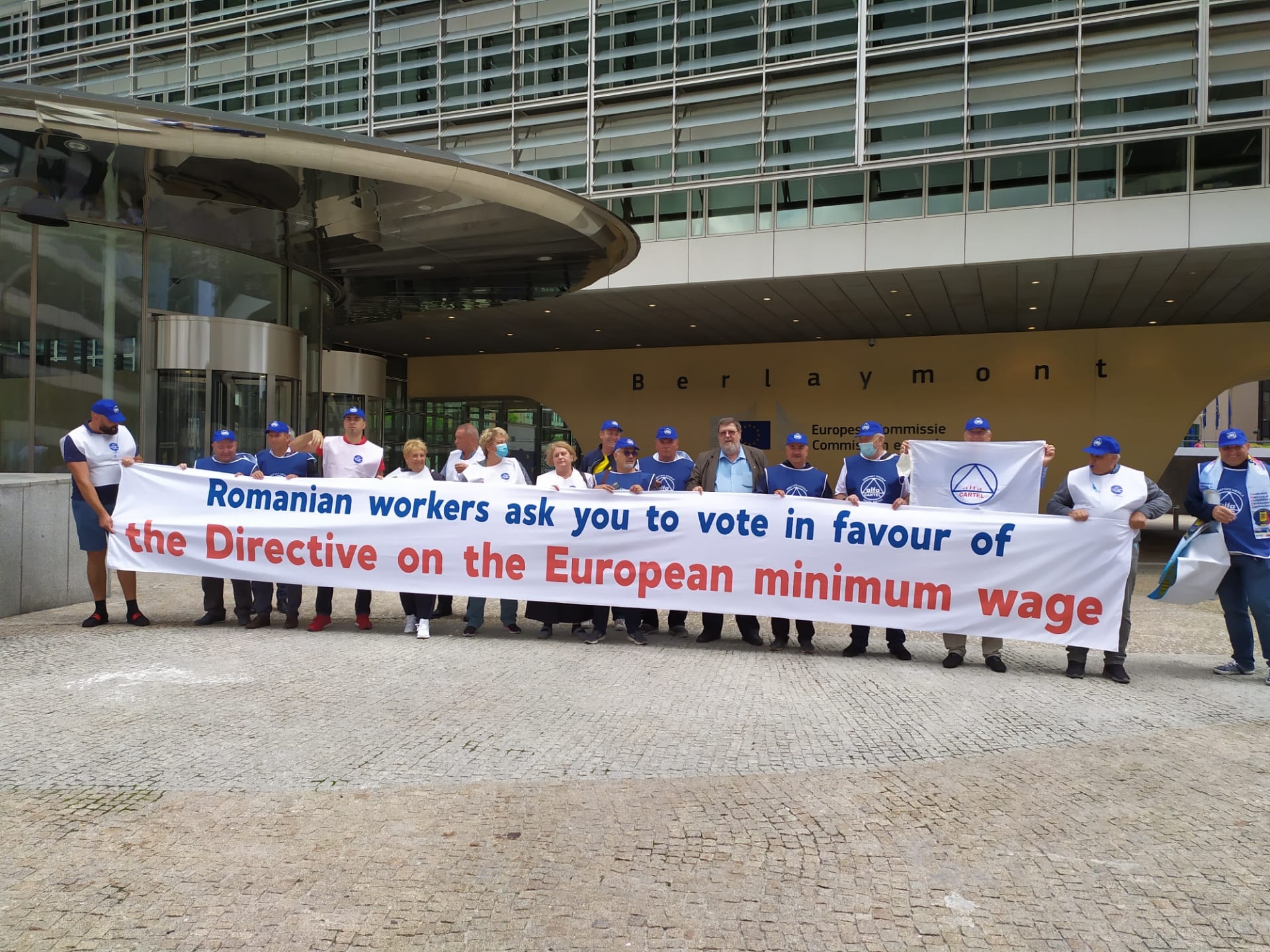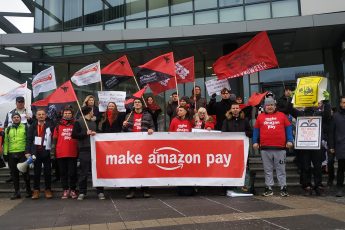
by TRANSNATIONAL SOCIAL STRIKE PLATFORM
We publish an interview to Vasile Gogescu, president of Trade Union Federation of Commerce Romania and Vicepresident of the National Confederation “Cartel Alfa”, that has taken part in the protests to push for the approval of the EU directive on a European minimum wage. While the President of the European Commission Ursula van der Leyen in her inaugural speech declared that to raise wages was one of the EU priorities, the discussion seems to be stuck between several resistances and the usual introduction of exemptions and reservations. The novelty of the drafted directive would be not so much the introduction of a minimum wage where there is not one: 21 countries already have a statutory minimum wage, and those who don’t (6 countries) would not be obliged to introduce one, because collective bargaining can be in charge to set minimum wages in place of the State law. The directive, though, would imply a raise of minimum wages up to 60% of the average wage of each country and clear norms to update its level: it would increase minimum wages in half EU countries and from 10 to 20 million workers would benefit from it, mainly from the precarized and informalized service sector, but also in the manufacturing sector with very low wage levels in Eastern Europe. No need to say that the 60% of the average wage is still very low, the 50% being the poverty line. The wages have gone so much down, that the percentage of people that are not able to make a living with their work is incredibly high in the EU. So much that in many sectors there is a high labor shortage due to the unavailability of workers to accept the existing wage conditions. Furthermore, van der Leyen said that if the wage levels fell too much, people would have to rely on public welfare to make a living, so, all the more after the pandemic’s teaching, an increase in minimum wages would allow people to save money to face emergencies on their own.
Against this directive, “Business Europe”, the coalition of employers’ confederations throughout Europe, has declared that the EU takes enterprises to be dispenser of welfare and wages to be “social transfer” rather than simply a compensation of the work done. The businessmen of Europe, those who have pushed for the dismantlement of the national labor codes and for the complete freedom of enterprise to build companies where wages are at the lowest, become now the champions of the national frameworks against the European intrusion. What they don’t say is that they benefit from the low wages of countries like Romania, so much as they benefit from the work of Romanian migrant workers, whose remittances are the conditions for keeping wages so low. With them Northern European trade unions, interested in preserving their own social bargaining model and defending “their” workers, are the toughest opposers to the directive, while as Vasile says, Italian unions bureaucrats say they would support it not for their own sake, but only out of solidarity with Eastern European workers. This is so because they were able to push for passing an exception according to which the introduction of a minimum wage is not compulsory in those countries where collective bargaining intervenes instead to set wage levels.
In previous years as TSS we claimed the need for a European minimum wage, equal throughout Europe, disconnected from the costs of living, as a political claim of equality between workers around Europe, connected by production and logistical chains, but divided by different treatments. The proposal contained in the directive is very different in that it sets wages according to national differences, preserving by this the differentiated possibilities of profits of industries. Nonetheless, we think it is necessary to open again a transnational discussion on wage levels and struggles around wages to understand how to push not only for the approval of the directive, but mainly for building a collective force that breaks the differences that criss-cross the European space.
TSS: With your trade union you started a struggle to push for the approval of the EU directive on a European minimum wage that is under discussion in the European Parliament. Can you tell us something about it?
Vasile: The Eu directive on European minimum wage is very important and as trade unions we have great expectations from this initiative for a European minimum wage. In Romania there are 5,2 million employees and 1,2 have usually minimum wages at the national level. More than 2 million people leave with less than 4500 euros per year, including bonuses and meal tickets. In the retail sector, approximately the 60% of workers get minimum wages and live with less than 4000 euros per year. To work is simply not enough to be able to make a living. More than 2 million people are not able to live with their work, they work and are living in poverty.
Especially the employees in the private sector are very unsatisfied and are those who usually migrate to other countries. There are 5.2 million employees in Romania and other 5 million who left the country looking for a better wage. The average gross salary in Romania is about 1140 euros. The level of this salary is raised by the salaries of state employees and those in the management of private economy companies.
A percentage applied to the average salary for the calculation of the minimum wage, according to the draft European directive, would lead to an increase in the income of employees paid with the minimum wage by almost 70%.
In the meeting in Porto the Romanian president supported the directive, in agreement with the majority in the Romanian Parliament. At some point, though, the Minister of Foreign Affairs emailed the EU MPs from Romania asking them not to vote the directive. There is this substantial ambiguity, so for us it is not clear what side the government (an alliance between liberals, rightwing and far rightwing parties) is going to support.
In any case, the Romanian labour ministry declared that even if the European directive will be approved, it will be implemented step by step and the increase in wages will be in place in 10 to 20 years! This declaration made us angry and so we started mobilizing. We organized many protests in front of the labor ministry, the Parliament, the President’s office and in many counties throughout the country. But they don’t want to hear us. To draw attention on the topic of the minimum wage we organized a caravan of social rights that started in Romania and arrived in Brussells and Strasbourg, where we had a meeting with the Romanian MPs. But the government is not listening to us.
TSS: Who is opposing the European directive on minimum wage?
Vasile: Basically, the trade unions confederations in northern European countries. In Brussells we met with representatives of other confederations, the Belgium, French and Italian ones, that said that they support the directive out of solidarity with us, even though it is not useful to them.
TSS: Those who support the European directive say it can help fighting social dumping and unfair competition between migrant coming from Eastern European countries and those who work locally. In any case given that many workers are temporary, seasonal or posted, there is a profit for enterprises that save in social costs that are paid by the state of origin. What do you think about this?
Vasile: Romania is the second country after Syria in number of migrants. But in Romania there is no war, except a war against workers who are treated like goods and not people. As I said, 30% of employees cannot live with their wages. Companies want wages to be at the lowest level possible. The EU directive would give Romanians a chance to survive here, it would help to decrease differences in salaries. If a Romanian wants to go to Germany to work in slaughterhouses, if the wage is only 20% better, maybe he or she would think twice whether to leave or not. But now differences are huge.
By the way, 95% of our members are employed by multinational companies: Carrefour, Metro Cash and Carry, Selgros Cash&Carry, Volkswagen, Auchan etc. that favour the low wages of the country. When multinationals came to Romania, they so to speak “civilized” the retail sector. They brought food security for the population: before you could not know if the food is fresh or not. For many products the price went down. Now prices are going up fast for no apparent reason. For example, all the retail companies had good profit in 2020 because people were scared that shops would close and bought everything. Even though the total amount of sells was lower than in 2019, despite the expenses of taking care of the employees, all the multinational companies had recorded profits in 2020. Probably, there are agreements between multinational companies to keep the prices of essential goods up.
TSS: We have discussed in the last years about the possibility to claim a European minimum wage. As TSS we insisted on the fact that we should fight against wage differentials, which will be institutionalized by the directive. In Amazon workers international is under discussion the possibility to ask for an equal wage for all Amazon workers, in spite of the living costs of the country, on the basis of the fact that the job done is the same. What do you think about this?
Vasile: We are aware of Amazon and their problems. Amazon bought in Romania a large area near Bucharest and intends to build a campus and a large warehouse able to serve a big part of Europe. They also meant to move research and IT there. For the time being it is just a project they are developing. The problem is that we know that at the moment companies active in Romania will not support the equalizing of wages with Western Europe. This is totally out of question for them. Romania is fourth in Europe when it comes to the rate of productivity in relation to wage levels. There are very low wages and high productivity. In Eastern European countries, the calculation of labor productivity is distorted by the export of capital that multinational companies make to the mother countries. But the wages are very low (we are the second last in the EU, after Bulgaria). We are the last country in terms of purchasing power of wages.
TSS: How did the pandemic influence your fight?
Vasile: The pandemic made the situation of workers worse: since the beginning of the pandemic the government has stepped on every social right. There is no social dialogue anymore in Romania. We have a very restrictive law on unionization, where to be able to negotiate you must have 50% + 1 membership of employees of the company.
Besides, the legislation to protect essential labor during the pandemic was only for healthcare workers, teacher or police. That’s it. Nobody had a good word for other essential workers or bonuses even though they worked more than before and they and their families took many risks, a lot. Many employees in retail sector got sick with covid 19: the rate of infections was double than the rest of the population.
Another thing is that the treatment for covid19 is not cheap for a regular employee. People in retail who got ill had to pay the cures from their salaries. The State did not pay! All the expenses the multinational paid to protect employees and clients, are not covered by company but employees! They made their budget one year before for 2020 and did not change it due to the pandemic: same budget, same targets, and all those additional expenses – like sanitizing gel, masks etc. – were paid by cutting the expenses by freezing salaries. They cannot decrease the profits, of course!
TSS: What actions are you planning around the European directive in the next months?
Vasile: We are going to continue the protest in Romania. This week we discussed about a next caravan to Brussels and meet people from EU commission to explain what would mean if such initiative would be approved. Here in Romania only 200 collective agreements at company level have been signed with trade unions; there is no sectoral collective agreement in private economy. There is no social dialogue at all. The EU now is threatening the Romanian government to cut recovery funds if they do not change their approach and listen to unions and workers. They said that they will stop helping if Romania doesn’t change. But it will happen slowly, and we will keep struggling.





